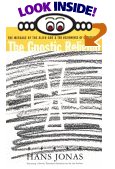

 The Gnostic Gospels by Elaine Pagels
The Gnostic Gospels by Elaine Pagels Gnosticism's Christian form grew to prominence in the 2nd century A.D. Ultimately denounced as heretical by the early church, Gnosticism proposed a revealed knowledge of God ("gnosis" meaning "knowledge" in Greek), held as a secret tradition of the apostles. In The Gnostic Gospels, author Elaine Pagels suggests that Christianity could have developed quite differently if Gnostic texts had become part of the Christian canon. Pagels argues that Christian orthodoxy grew out of the political considerations of the day, serving to legitimize and consolidate early church leadership. Her contrast of that developing orthodoxy with Gnostic teachings presents an intriguing trajectory on a world faith as it "might have become." The Gnostic Gospels provides engaging reading for those seeking a broader perspective on the early development of Christianity. --F. Hall

 The Gnostic Religion: The Message of the Alien God & the Beginnings of Christianity by Hans Jonas
The Gnostic Religion: The Message of the Alien God & the Beginnings of Christianity by Hans Jonas
Four years after his death the works of Hans Jonas - one of the most original and prominent thinkers of his generation - have also reached India. His life spanned 90 years of our century (from 1903 to 1993), and like few other Western intellectuals he was able to see the deep and dramatic changes that have taken place in the entire so-called civilised world. He was a German Jew, a pupil of Martin Heidegger, considered at that time the world’s greatest living philosopher, and of the famous Protestant theologian Rudolf Bultmann.
 After Hitler had come to power he first emigrated in 1933 to England, then in 1935 to Palestine, finally in 1949 to Canada, where he taught for six years at McGill and Carleton Universities, before settling down permanently in New York (teaching at the philosophy department of the New School for Social Research). The range of his topics was extremely wide - from early gnosticism to the philosophy of biology, from ethics to social philosophy, from cosmology to Jewish theology. Shaped by his exile from Nazi Germany, the murder of his mother in the Auschwitz concentration camp, his participation as a soldier in World War II and the Israeli War of Independence, he set himself the task of uncovering the intellectual origins of the crisis of Western civilisation and proposing a new, positive orientation for humanity. Source:http://www.germanembassy-india.org/news/may97/05gn05.htm
After Hitler had come to power he first emigrated in 1933 to England, then in 1935 to Palestine, finally in 1949 to Canada, where he taught for six years at McGill and Carleton Universities, before settling down permanently in New York (teaching at the philosophy department of the New School for Social Research). The range of his topics was extremely wide - from early gnosticism to the philosophy of biology, from ethics to social philosophy, from cosmology to Jewish theology. Shaped by his exile from Nazi Germany, the murder of his mother in the Auschwitz concentration camp, his participation as a soldier in World War II and the Israeli War of Independence, he set himself the task of uncovering the intellectual origins of the crisis of Western civilisation and proposing a new, positive orientation for humanity. Source:http://www.germanembassy-india.org/news/may97/05gn05.htm

The Imperative of Responsibility: In Search of an Ethics
for the Technological Age by Hans Jonas
In a brilliant book, which should be read by anyone concerned about sustainability, "The Imperative of Responsibility: In Search of Ethics for the Technological Age" (The University of Chicago Press, Chicago, 1984) Hans Jonas argues that there is a need for a new ethics that will better enable our civilization to deal with the power over the ecosphere that it has acquired through science and technology.
The book opens as follows: "All previous ethics — whether in the form of issuing direct enjoinders to do and not to do certain things, or in the form of defining principles for such enjoinders, or in the form of establishing the ground of obligation for obeying such principles — had these interconnected tacit premises in common: that the human condition, determined by the nature of man and the nature of things, was given once for all; that the human good on that basis was readily determinable; and that the range of human action and therefore responsibility was narrowly circumscribed. It will be the burden of the present argument to show that these premises no longer hold, and to reflect on the meaning of this fact for our moral condition. More specifically, it will be my contention that with certain developments of our powers the nature of human action has changed, and, since ethics is concerned with action, it should follow that the changed nature of human action calls for a change in ethics as well: this not merely in the sense that new objects of action have added to the case material on which received rules of conduct are to be applied, but in the more radical sense that the qualitatively novel nature of certain of our actions has opened up a whole new dimension of ethical relevance for which there is no precedent in the standards and canons of traditional ethics."
Source: Institute for Green Oxidation Chemistry

 Gnosis : The Nature and History of Gnosticism by Kurt Rudolph
Gnosis : The Nature and History of Gnosticism by Kurt RudolphKurt Rudolph is an internationally recognized authority on Gnosticism. He is professor of history of religion at Philipps Universität, Marburg, West Germany.
"Kurt Rudolph is the world's leading expert on the only branch of Gnosticism to survive down to the present he does for the next generation what Hans Jonas did for the generation just past." (back cover) James M. Robinson, General Editor, The Nag Hammadi Library in English (back cover

 When Jesus Became God: The Struggle to Define Christianity during the Last Days of Rome by Richard E. Rubenstein
When Jesus Became God: The Struggle to Define Christianity during the Last Days of Rome by Richard E. Rubenstein
About the Author
Richard E. Rubenstein is a professor of Conflict Resolution and Public Affairs at George Mason University, where he specializes in religious conflict. A graduate of Harvard College, Oxford University (Rhodes Scholar), and Harvard Law School, he lives in Fairfax, Virginia.
Product Description: The story of Jesus is well known, as is the story of Christian persecutions during the Roman Empire. The history of fervent debate, civil strife, and bloody riots within the Christian community as it was coming into being, however, is a side of ancient history rarely described. Richard E. Rubenstein takes the reader to the streets of the Roman Empire during the fourth century, when a fateful debate over the divinity of Jesus Christ is being fought. Ruled by a Christian emperor, followers of Jesus no longer fear for the survival of their monotheistic faith but break into two camps regarding the direction of their worship. Is Jesus the son of God and therefore not the same as God? Or is Jesus precisely God on earth and therefore equal to Him? The vicious debate is led by two charismatic priests. Arius, an Alexandrian priest and poet, preaches that Jesus, though holy, is less than God. Athanasius, a brilliant and violent bishop, sees any diminution of Jesus' godhead as the work of the devil. Between them stands Alexander, the powerful Bishop of Alexandria, who must find a resolution that will keep the empire united and the Christian faith alive. With thorough historical, religious, and social research, Rubenstein vividly recreates one of the most critical moments in the history of religion.

The Secret Books of the Egyptian Gnostics: An Introduction to the Gnostic Coptic Manuscripts Discovered at Chenoboskion by Jean Doresse
These Gnostic texts from the 4th century reveal the world of early Christianity and include The Gospel According to Thomas. This firsthand account of the discovery includes the first complete publication of the documents.